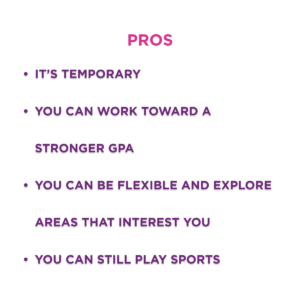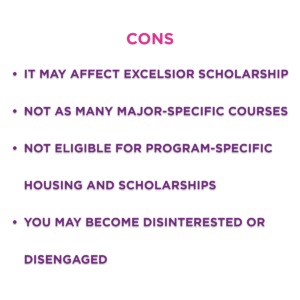It is common for students to be undeclared or undecided when they start their first year of college. According to SUNY’s Recruitment Response Center, as of November 2022, more than 25,000 SUNY applications for the fall 2023 semester were for “undeclared major.” To help put this in perspective, we spoke to advisors from Alfred State College to help define the undeclared major, explore the benefits of being undecided during your first-year or when you go back to college as an adult, compare the pros and cons of this academic path.
Key points to know:
- For the fall 2023 semester, more than 25,000 applications were undeclared majors.
- At a 4-year college, you can be undeclared or undecided until you earn 30 credits or reach your second year of college.
- Undeclared and undecided students can explore careers and courses in their first year of college while earning general education credits.
- Community college students cannot be undeclared or undecided, so they enroll in AS and AA degree programs such as Individual Studies and Liberal Arts.
- Being undecided or undeclared may affect Excelsior Scholarship eligibility if the student is about to hit the 30-credit DAC (degree applicable credit) limit within one year.
Now let’s get to it:
What is an Undeclared or Undecided Major?
Undeclared and undecided simply means you have not officially committed to a major because you are either not ready to choose a career path or choose a degree; however, once you think you know, chances are you will change your major anyway before you graduate.
The US Department of Education reports 30% of students will change their major at least once within 3 years, and about 1 in 10 students change their major more than once before they graduate college. Being undecided or undeclared gives students the space to figure out what they want to do.
When do you have to declare a major?
When you are required to declare a major depends on the college you are at. For example, you cannot be undecided or undeclared at a community college. If a community college student doesn’t know what they want to study, or they have a path in mind, but the school does not offer the associate degree, they will work closely with an advisor to choose individual studies or liberal arts associate degrees, which allows them to build a degree program that complements their interests and/or transfers to a 4-year degree program at a 4-year college.
According to Alfred State College, at a typical 4-year college or university, students can be undeclared until they reach 30 or more credits or enter their second year of college.
Is it bad to be undeclared? What are the pros and cons?
It is not bad to apply to or enroll in college as an undeclared major, because being an undeclared student has its benefits.
Pros:
It’s temporary
One major benefit of undecided or undeclared is that it is only temporary. Alfred State College advisors point out that as an undecided or undeclared major, you must enroll in general education courses, but you can also take exploratory courses to help you decide on a field that interests you.
You can work toward a stronger GPA
Students who are interested in rigorous or selective programs such as engineering, business, education or pre-med can enter as undecided or undeclared to build a strong GPA and experience for consideration into these programs if they were not ready for admission as a first-year student.
You can be flexible and explore
When you are undecided or undeclared, you can take different courses and apply to internships to help you to explore and find the best field for you. Flexibility reduces the stress of choosing a major right away and allows you the space to figure it out.
Cons:
The cons of being an undecided student are few, but they can have a financial effect.
It may affect the Excelsior Scholarship
Being an undecided or undeclared student may affect Excelsior Scholarship eligibility if you are about to hit the 30-credit DAC (degree applicable credit) limit within one year, according to Alfred State advising team. Students in that situation may be encouraged to declare a degree to assist with Financial Aid needs. Otherwise, prior to that 30-credit limit, all coursework should be considered degree-applicable.
You don’t get in as many major-specific courses in the first two years
Students who are undecided or undeclared should work closely with their academic advisor to understand the challenges. Fortunately, many college admissions’ offices don’t expect first-year students to have a solid plan just yet. If you don’t take the major-specific courses you need, they may be open to declared majors first with limited availability for others. Some majors have strict requirements that may take several years to complete, and not declaring a major or taking the required courses on-time could delay your graduation timeline.
You won’t be eligible for major-specific scholarships or housing
Colleges offer program-specific scholarships and aid for students, for which undeclared students are not eligible.
You can become disinterested
If you take a lot of classes that don’t interest you, you can become unmotivated and lose focus. When you choose a major, it puts you on track and allows you to take classes that you find engaging and interesting.
Advice from advisors about choosing a major
When you can’t decide on a major or an academic path to degree, Afred State College advisors recommend that you “talk with anyone and everyone related to the field about its pros and cons. Start with the department instructors and the department chair. They are the experts in that field within the college and are the best places to start. Be upfront and honest about your questions and concerns!” In addition, you can:
- Take classes that interest you
- Build a degree path that leads to a potential career goal
- Try different internships, jobs, and campus positions
- Visit the career services office to learn about what is in demand
Finally, you can understand the gap year option before starting college. Students who are not ready to choose a major or start college right after high school can take a gap year to explore their options and start college later. Real-world (job) experience could be particularly useful and may translate over to on-campus opportunities when you’re ready to build that degree path. However, the advisors point out that deciding to take a gap year is situational, depending on how a student is living, their finances, etc.
Overall, being an undecided major can have both advantages and disadvantages, and the decision to declare a major is ultimately a personal one that should be based on your unique circumstances, interests, and goals. But don’t be afraid to apply to college if you still don’t know what you want to do. You have time to figure it out and find that path at SUNY.







